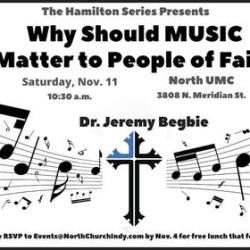I am delighted that a student whose honors thesis I am currently supervising will be presenting at this year’s Undergraduate Research Conference at Butler University. Here are the details about the presentation:
The Dynamics of Interfaith
Rachel Koehler Butler UniversityFaculty Sponsor(s): James McGrath Butler UniversityToday, there is an ongoing debate within and between different faiths regarding the correct way to interact with religious diversity. For example, exclusive language is found in several religions, which states that individuals can only experience the Ultimate through a specific faith practice. This belief directly challenges the relevance of interreligious dialogue, but a spectrum exists amongst adherents of different faith communities in how they understand religious diversity amid absolute truth claims in their own tradition. The goal of my research is to illustrate this debate, so my audience has a foundation on which to build. Then, I will introduce my case study on the Center for Interfaith Cooperation (CIC), which is a local organization that seeks peaceful dialogue in an interfaith setting. I have and will continue to interview board members within the CIC to get their perspective on why interfaith work is so important. Their input is meant to add to the conversation not to provide an inerrant approach to religious diversity. It is my attempt to merely record their oral histories rather than reach a conclusive answer to the debate.
My hope is that through this project people will be able to recognize the importance of interreligious dialogue and gain some insight on how dedicated members of the CIC have reconciled interfaith to their own faith. Hate crimes against religious communities is a real, current threat, so conversations that unite rather than divide are extremely important.When & Where
02:00 PM
Jordan Hall 336C
The Undergraduate Research Conference happens at Butler every year, and is a great opportunity for students from around the Midwest and across the country to present papers and have a fantastic conference experience already as undergraduates. Here are more details from the URC website:
The Undergraduate Research Conference (URC) is celebrating its 31st year of providing students from around the country an opportunity to showcase their research and creative endeavor.
Last year, the Butler URC welcomed more than 900 registered participants who attended 480 presentations!
We welcome your participation and attendance at this year’s conference on April 12, 2019.
It has been a particularly rewarding experience working with Rachel on her research. It was actually conversations with her, exploring a possible research avenue that she ended up not pursuing, that inspired the start of my book project on What Jesus Learned From Women. You can read more from Rachel about her work on producing a podcast that features interviews with the CIC leadership in a post she wrote for the Center for Faith and Vocation blog.
Of related interest, Barbara Brown Taylor shared this advice from Krister Stendahl:
- When trying to understand another religion, you should ask the adherents of that religion and not its enemies.
- Don’t compare your best to their worst.
- Leave room for holy envy.
See also:
https://www.redletterchristians.org/barbara-brown-taylor-has-holy-envy-and-its-changed-her-christian-life/
There have been other articles about interfaith, including one on Israel in Commonweal. Here is an excerpt:
Part of the challenge in creating a context for dialogue, according to Rabbi David Rosen, the Jerusalem-based director of interreligious affairs for the American Jewish Committee, is that Israeli society is structured in a way that doesn’t easily facilitate interactions between different groups. “People live generally segregated lives here and that’s exacerbated by the educational system,” Rosen said. Ultra-orthodox (Haredi) Jews and modern Orthodox Jews have separate educational systems. Arabs are part of the mainstream secular system of education in Israel, but because ethnic and religious communities voluntarily self-segregate, there are few if any interreligious or even religious-secular encounters. In addition, all marriages in Israel are under the purview of religious authorities, and there is no state-recognized intermarriage. If you’re a Jew and want to marry a Christian or Muslim, you have to travel outside of the country. Rosen, who founded Rabbis for Human Rights three decades ago, has played a leading role in spurring interreligious efforts here and abroad. “We have to resist the zero-sum game where anything that is bad for the Palestinians is good for Israelis, and anything that is bad for Israelis is good for the Palestinians,” he said.













